From sea turtles to sunsets, the surprising ways the coronavirus pandemic is impacting the environment
Is the environment better off since major cities across the globe are in lockdown and humans have stayed inside? On this Earth Day, here are seven ways the coronavirus pandemic is helping — and hurting — the environment.
Animals are benefiting from people being stuck inside, somewhat
People are reporting seeing more animals roaming city streets: mountain lions walking through downtown Boulder, Colo., monkeys and horses flooding residential neighborhoods in parts of India, coyotes running through the streets of Chicago.
“It does seem as though the absence of humans from the streets and from our parks is having a beneficial effect on wildlife,” says Peter Gleick, a climate scientist and president of the Pacific Institute, a nonprofit research organization in California.
“Is nature getting a little bit of a break in some ways, and is that good for it? The short answer is yes,” says Carl Safina, ecologist and author of Becoming Wild: How Animal Cultures Raise Families, Create Beauty and Achieve Peace.
But the reason for the rise in animal sightings might be due to another reason. “People are staying home, so they’re bored,” says Gary Comer, a wildlife management supervisor in Columbus, Ohio. “They’re looking out their windows, and quite honestly, a lot of this wildlife activity was probably always taking place, but they just weren’t observing it because they were either at work or they were occupied, busy with other things.”
Short straw gets to go tell the mountain lions they are not social distancing properly... Taken by reader KB in north #Boulder over the weekend pic.twitter.com/dcl1XzcdJY
— Mitchell Byars (@mitchellbyars) March 23, 2020
Another thing to keep in mind, says Comer: It’s spring and it’s mating season. “COVID-19 doesn’t mean anything to wild animals,” he says. “Nature is still doing its thing. The birds are initiating their nests, and we’re probably six weeks away from whitetail deer dropping fawns in a big, big way.”
Many on social media have hypothesized that while humans are on lockdown nature is healing itself and animals are reclaiming the land.
“If people are not out fishing, the fishing boats are tied to the docks, then the fish are not being killed. If they’re not being killed, they’ll probably have a better spawning year,” says Safina. “Those things are true, and that most resonant line from Jurassic Park always comes to mind. ‘Life finds a way.’ Life lives.”
Comer doesn’t fully agree. He points to more green spaces in urban areas, better water quality treatment practices that make optimal habitats for birds, deer and even coyotes. “The wildlife is learning how to coexist and interact with us and take advantage of the situations that we create.”
“I get a lot of, ‘Hey, these animals are showing up and we did take this land from them first and they’re taking it back.’ And in reality, what I think is actually happening is our land-use practices and changes are actually creating somewhat optimal conditions for certain species.”
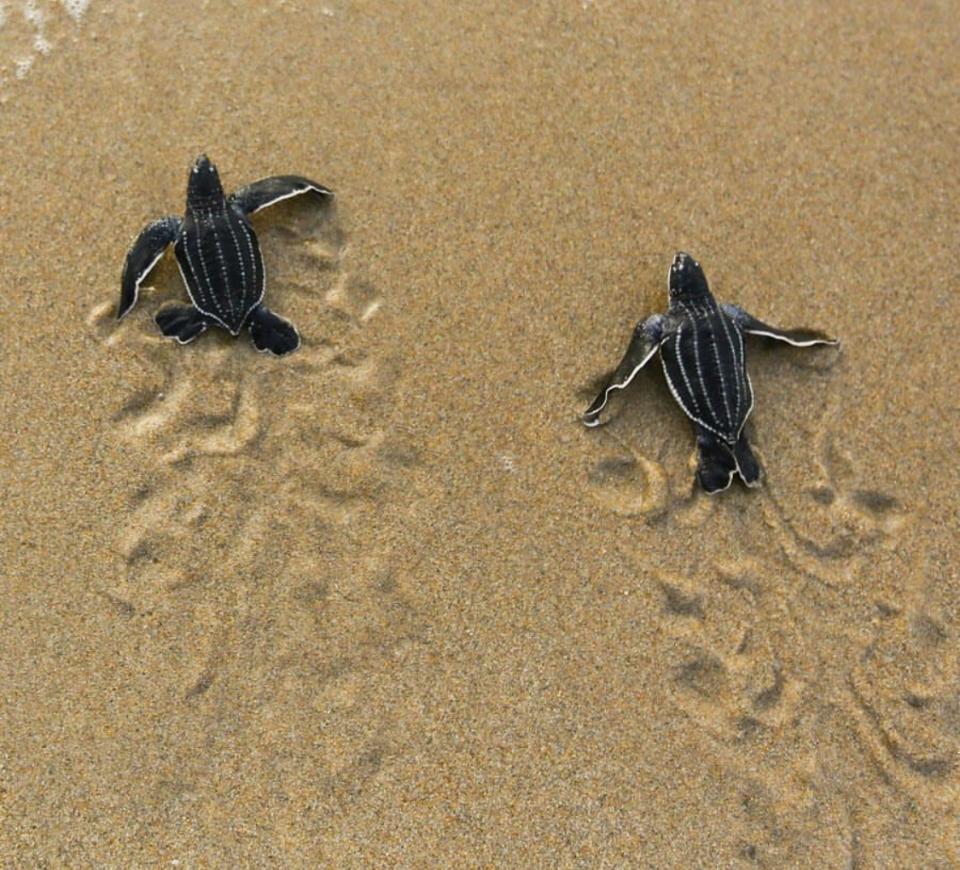
Sea turtles are set to have an amazing summer
The stay-at-home orders mean fewer tourists on the beaches in Florida and fewer boats, fishing and cruise ships in the waters off the coast. That makes conditions prime for nesting leatherback sea turtles and their hatchlings.
“It just so happens that the pandemic, the stay-home orders, the closure of many of our beaches, has caused people to adhere to the behaviors that we’ve been asking people to do for a long time,” says David Godfrey, executive director of the Sea Turtle Conservancy in Gainesville, Fla., the world’s first and oldest sea turtle conservation group.
Godfrey says 90 percent of all sea turtle nesting in the United States takes place in Florida. During the spring and summer months, sea turtles migrate to the beaches of Florida from the northeastern United States and the Caribbean to lay eggs on the beaches.
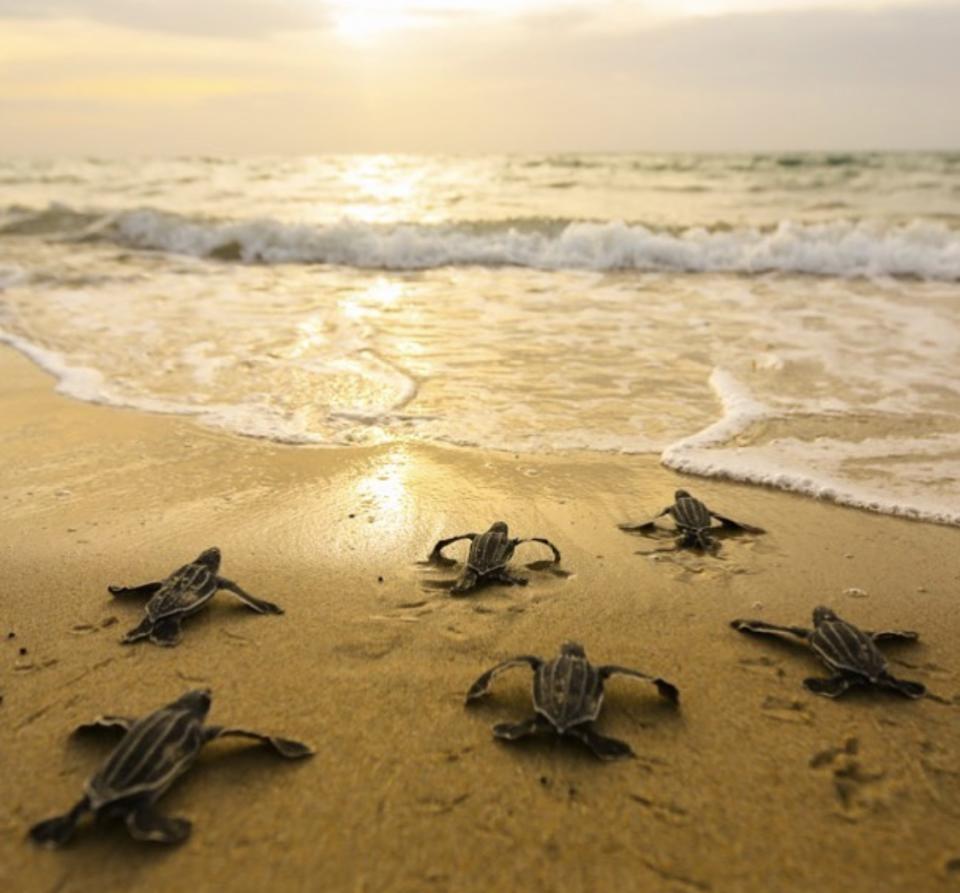
Reductions in tourists on the beach and water sports have led to prime conditions for sea turtles to lay eggs in nests; less boat traffic results in fewer injuries and deaths of migrating sea turtles. Less foot traffic on the beaches means nests aren’t as easily disturbed. “Boat strikes are one of the leading causes of mortality of sea turtles around Florida,” he says.
Every year, the organization tracks sea turtle injuries and deaths due to boats as well as the hatchlings that don’t make it to the ocean. By the end of the summer, because of such a drastic reduction in human activity, Godfrey says, he anticipates a higher nesting rate and survival rate for sea turtles. “We expect a lot more survivorship of the hatchlings that are produced in Florida this year.”
Each year, the organization asks residents and tourists to alter their behavior during nesting season, using amber lights and avoiding nesting areas.
“Sometimes you can’t see whether your behavior change really is going to make a difference or not,” he says. “This is an opportunity to show that it does. So not only are we saying this should help, we can prove it will help — and I’m looking forward to having the hard data to show them.”
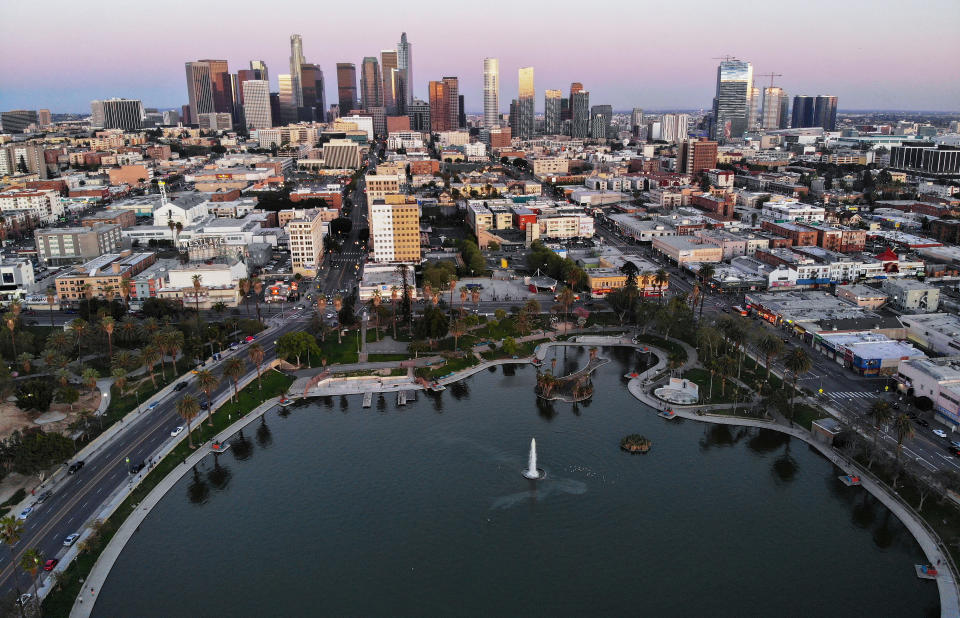
The pandemic has already reduced greenhouse gases
Across the world, air pollution is plummeting during the lockdown. A new study from IQAir shows that air pollution levels in 10 major global cities have dropped 9 percent to 60 percent during the coronavirus pandemic lockdowns.
Delhi, India, has had a 60 percent reduction in pollution compared to this time last year. Seoul, South Korea, had a 54 percent reduction and Wuhan, China, had a 44 percent reduction when the city was on lockdown.
Satellite images from NASA’s Earth Observatory show a drop in pollution across China since the start of the pandemic.
Air pollution in China has decreased significantly after the Corona Virus outbreak. Image from the NASA Earth Observatory. pic.twitter.com/Dp2Cwq3PVI
— Skimpy (@kevo_skimpyy) March 1, 2020
A Stanford University researcher estimates that in China alone, reduced emissions have saved the lives of 4,000 children under the age of 5 and 73,000 adults over the age of 70.
The European Space Agency shows nitrogen dioxide emissions (NO2) dropped dramatically over Italy. The agency’s Sentinel-5P satellite shows that concentrations of NO2 dropped drastically between Jan. 1 and March 12, particularly over northern Italy, which was hardest hit by the coronavirus.

The IQAir report says that in early April, Los Angeles’s air quality “was among the best in the world” due to the shutdowns.
All week long @LACity has had some of the cleanest air in the world... less cars, less smog, fresh breezes & spring rain. #Hope #SilverLining @IQAir @CleanairCA @lapublichealth @PabloWeather @sustainUCLA @LATimescitybeat #MyDayInLA #WeAreInThisTogether pic.twitter.com/AQ1EHtt5F0
— Chris Giza (@griz1) April 11, 2020
“The good news is that we do see drops in air pollution in big cities. In fact, over very wide regions we see drops in air pollution. We’ve seen a drop in emissions of greenhouse gases — the gases responsible for climate change,” says Gleick. But he says these changes are short-term. “They’re very unlikely to be permanent unless we fundamentally change our economies, which is a much harder thing to do.
He says this lockdown has proved that the environment is resilient and can bounce back from negative impacts due to human activity. “But it’s not going to be permanent unless we really address the burning of fossil fuels,” he says. “The question is whether we’ll be able to act on it in a way that permits us to have both a healthy environment and a healthy economy. That’s got to be the ultimate goal.”
”Milan is to introduce one of Europe’s most ambitious schemes reallocating street space from cars to cycling and walking, in response to the coronavirus crisis.” https://t.co/crSIMT5G5G
— Greta Thunberg (@GretaThunberg) April 21, 2020
Cities might ‘wake up’ and change environmentally damaging habits
This week Milan announced one of Europe’s most ambitious plans to reallocate city streets for bikes and pedestrians — and not for cars — in response to the coronavirus pandemic.
During the lockdown in Milan, car traffic congestion dropped 30 percent to 75 percent. According to the Royal Netherlands Meteorological Institute, air pollution dropped nearly 50 percent.
In a statement, Marco Granelli, Milan’s councillor for mobility and public works, said, “To avoid having another million cars in the streets, we will have to boost the two wheels: more bicycles and more electric scooters.”
The city plans to turn 22 miles of the street into new cycle paths in May and June. It also plans to extend sidewalks so citizens can maintain social distancing while walking.
“The fact that air pollution drops so dramatically in Southern California and in China and in India and everywhere where we shut down the economy has shown people that we can have clean air, we can have views of the mountains in India from 100 miles away, that they haven’t seen in decades,” says Gleick. “My hope is that it’s going to wake people up to the fact that we’ve been putting up with a lot of bad environmental damage that maybe we don’t have to put up with.”
He cites Beijing after the 2008 Olympics as an example. In the months leading up to the event, the Chinese government aggressively reduced emissions to improve the city’s air quality through strict restrictions on car and truck use, closing factories and more. The result: Just in time for the Olympics there was a 60 percent reduction in sulfur dioxide, a 48 percent reduction in carbon monoxide and a 43 percent reduction in nitrogen dioxide.
“And the people noticed,” says Gleick. “When the Olympics were over, there was a fairly strong public reaction that, ‘Look, we like this clean air,’ and the government took steps to reduce air pollution from industries around Beijing.”
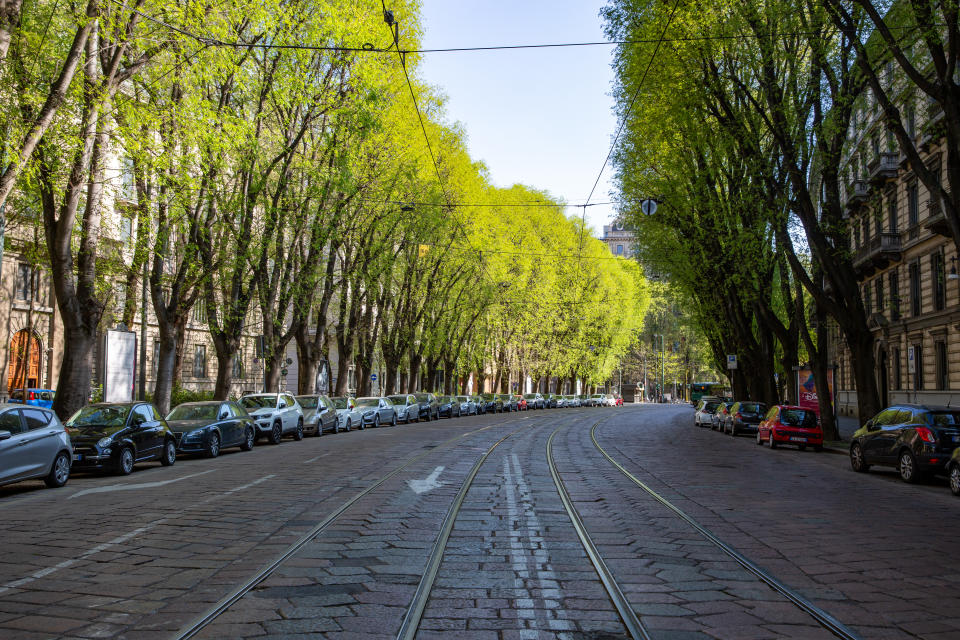
Gleick hopes, after the pandemic lockdown orders are lifted, cities will strive to keep emissions lower, as Milan is doing.
“We’re doing a great experiment, unplanned, but a great experiment in how resilient nature might be to changes in the way humans act and behave. I guess in the long run, my hope would be that we learn some of these lessons, that we don’t go back to normal,” he says.
He adds that it isn’t about shutting down the economy to change the environment but changing the economy to better protect the environment.
“I would imagine that there will be permanent changes in traffic rules and patterns in New York,” he says. “I think that’s going to be true in parts of California where we’re beginning to see pressure to change the way we have automobiles in our big cities.”
California Gov. Gavin Newsom has ordered the entire state of California to stay home, and businesses to be shut down to avoid the spread of the coronavirus. The same action has been taken by Los Angeles Mayor Garcetti. I can finally appreciate a Venice sunset without pollution. pic.twitter.com/cypMQTEeeo
— Jerry Avenaim (@avenaim) March 20, 2020
This summer, sunsets could be way more beautiful due to less air pollution
If air quality continues to improve in cities with a lot of pollution, there’s a chance the summer will bring particularly beautiful sunrises and sunsets.
“Theoretically that should lead to at least prettier, vibrantly colored sunsets,” says Stephen Corfidi, meteorologist and research associate at the Cooperative Institute for Mesoscale Meteorological Studies (CIMM) with the University of Oklahoma and the National Oceanic and Atmospheric Association (NOAA).
There is no data to support this theory, and we are only a month or two into the pandemic. But Corfidi says if the conditions are right, in theory, there will be more spectacular skies as pollution decreases. The key, he says, is to have less particle accumulation in the atmosphere and warmer weather.
“What spoils a pretty sunset, particularly in the summertime when there can be an accumulation of a lot of large particles in the lower part of the atmosphere … if you took away all those particles [the sunset] would be noteworthy enough.”
He says tiny particles create more vibrant colors and larger particles, due to pollution, dilute that color, creating those hazy summer days. “The sky is still blue, but it’s shifted toward a whiter blue. It’s a less saturated blue.”
He adds that, from a scientific perspective, it would be quite difficult to quantify an uptick in beautiful sunsets since beauty is subjective.
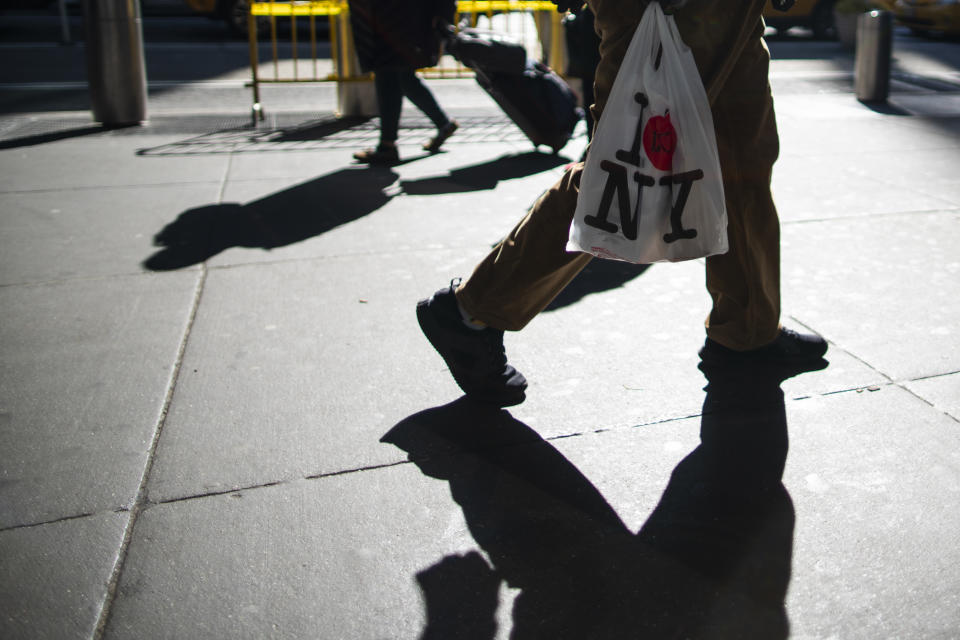
State bans on single-use plastic bags are being delayed due to the pandemic
In the past decade, states across the country have enacted bans and taxes on single-use plastic bags, encouraging shoppers to switch to reusable bags. However, in light of the pandemic, some major grocery chains are not allowing people to bring in those reusable bags, citing health and sanitary concerns. Some states and cities are no longer enforcing bans on single-use plastic bags, but several states, like Maine, are delaying these bans instead because of the pandemic.
But the plastic industry is now arguing that in order to maintain public health, single-use plastic bag bans must be overturned because of the danger posed by reusable shopping bags.
“The most important thing is to not put the front-end grocery store workers in any unnecessary risk,” Matt Seaholm, executive director of the American Recyclable Plastic Bag Alliance, told Politico. The alliance represents the plastic bag industry and is an independent arm of the Plastics Industry Association. “Grocery stores are one of the few places that are going to remain open, and there’s no need to force some sort of a policy of a bag ban when there are much more important things to deal with.”
See in 3D how much plastic is used around the world every hour, day, year and decade.
But Judith Enck, president of Beyond Plastics at Bennington College in Vermont and former EPA regional administrator, says the plastics industry is in public relations overdrive. “They’re circulating information that’s not always accurate,” she says.
Beyond Plastics is a nationwide project that tracks plastics policy across the country. Enck says she hasn’t been able to find any proof or studies that show reusable bags are putting grocery store workers at risk of contracting COVID-19. But she points to a New England Journal of Medicine study that shows COVID-19 can live on plastic for two to three days.
In New Jersey, environmental groups are reaching out to 54 mayors, urging them not to overturn their plastic bag laws during the pandemic.
But some in the plastic industry maintain that the coronavirus has shed light on the benefits of using plastic, including for hygienic food protection, safe drug packaging and more.
In a statement, Mara Hancker, managing director of Industrievereinigung Kunststoffverpackungen, a German association for plastic packaging and films, addressed critics who say the plastic industry is exploiting the pandemic.
“Critics may now say that the industry is just exploiting a good opportunity. The industry’s answer to this is very clear: ‘Yes, we are.’ This is because we see a huge opportunity for a discussion about our products that is finally differentiated — away from populist demands for bans and toward sustainable decisions for more climate protection with plastics.”
Enck says, in general, Americans are using less plastic bags during the pandemic because we’re shopping less. But as oil and gas prices get lower, she says, it’s making environmental conditions even worse.
“Historically, plastics were made from chemicals and oil. Today, it’s mostly made from chemicals and ethane, which is a by-product of hydrofracking. So as the cost of hydrofracking gas goes down, it’s cheaper to make single-use, cheap plastic packaging,” she says.
There have been environmental rollbacks during the pandemic
During the pandemic in the United States, the Trump administration has made efforts to roll back environmental protections as a way of helping businesses as the economy takes a hit.
But environmentalists are concerned over the number of rollbacks that have been announced since the pandemic began.
“It’s just a killing field of environmental protection regulations,” says Enck.
“The Trump administration has offered waivers on environmental monitoring and enforcement of pollution standards,” says Gleick. “They’ve accelerated the rollback of important regulatory protections for things like mercury and heavy metals from oil and coal-fired power plants.”
Enck points to a recent Harvard study that shows high air pollution has been linked with higher COVID-19 death rates.
“This is a time when we should be tightening air pollution controls. Instead, the Trump administration is doing the opposite,” she says.
For the latest coronavirus news and updates, follow along at https://news.yahoo.com/coronavirus. According to experts, people over 60 and those who are immunocompromised continue to be the most at risk. If you have questions, please reference the CDC’s and WHO’s resource guides.
How to maintain your physical and mental health during the pandemic
Taking care of a loved one with COVID-19? Here’s how to stay healthy
Q&A with Dr. Kavita Patel: How to keep your family safe and maintain your mental health
Read more from Yahoo Life
Hero’ nurse says arranging a family call gave coronavirus patient ‘a reason to fight’
How the coronavirus pandemic has 'decimated' the wellness tourism industry
Andrew Zimmern shows us how to make spicy peanut noodles using pantry ingredients
Want daily lifestyle and wellness news delivered to your inbox? Sign up here for Yahoo Life’s newsletter.

